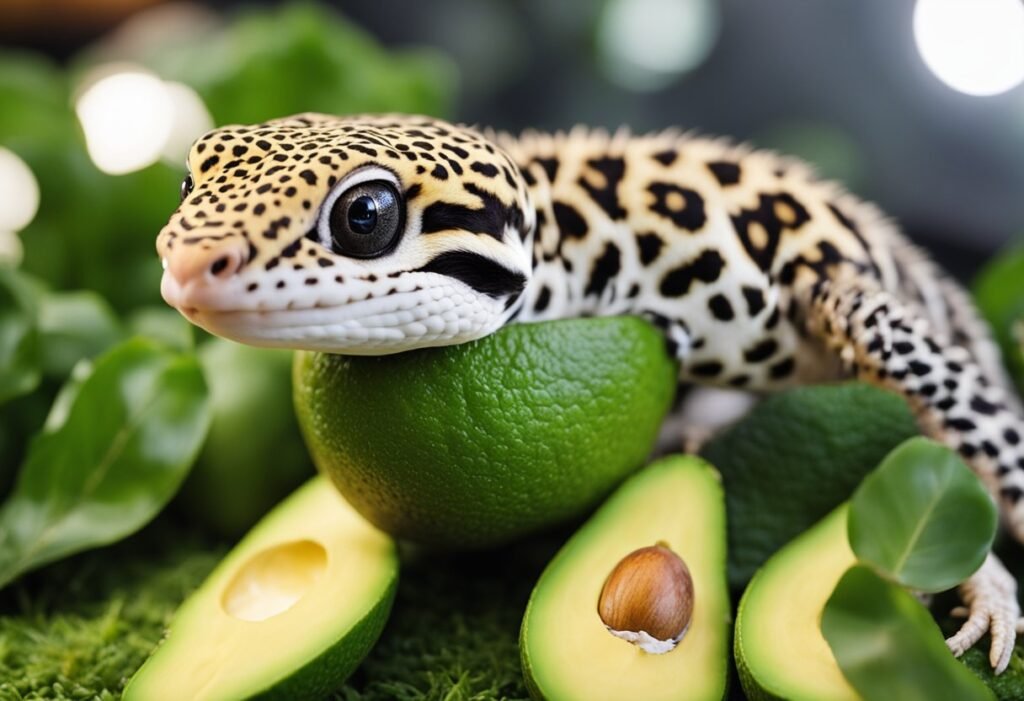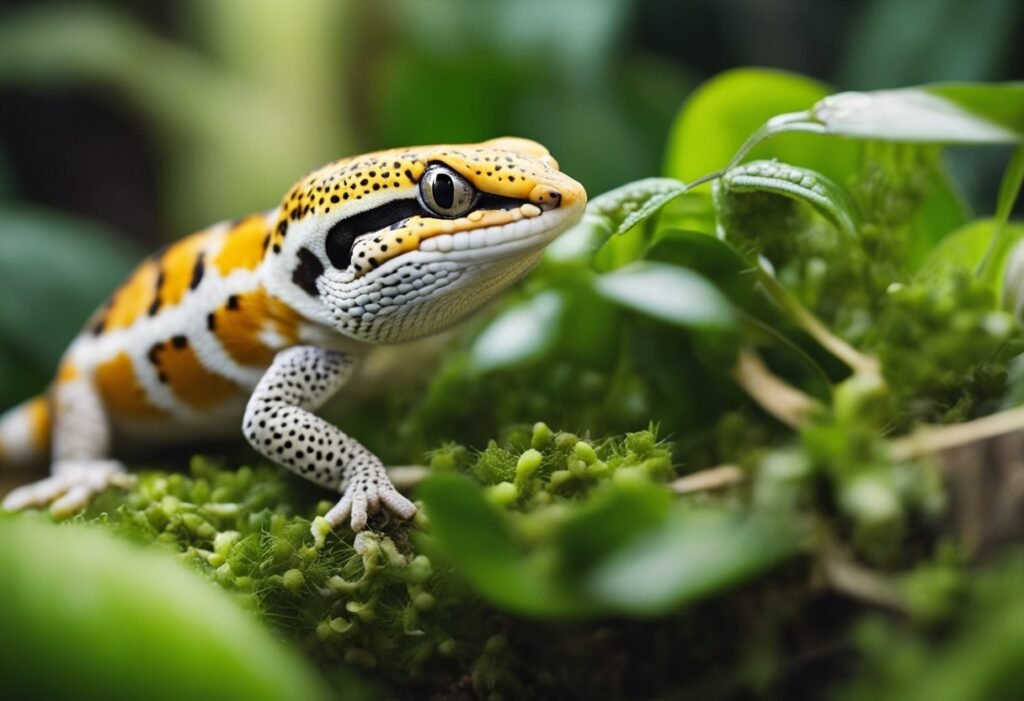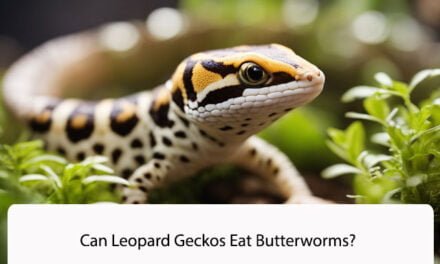Leopard geckos are popular pets known for their docile nature and unique appearance. As reptiles, they require a specific diet to thrive, and many owners wonder if they can feed their geckos certain human foods. One common question that arises is whether or not leopard geckos can eat avocado.
Avocado is a fruit that is rich in healthy fats and nutrients, making it a popular choice for human consumption. However, when it comes to feeding leopard geckos, it is important to consider their specific dietary needs. While some fruits and vegetables can be beneficial for these reptiles, others can be harmful or even toxic. So, can leopard geckos eat avocado? We’ll explore the answer to this question in the following paragraphs.
Leopard Gecko Dietary Basics

When it comes to feeding leopard geckos, it’s important to understand their nutritional requirements and provide them with a balanced diet. In this section, we’ll cover the basics of leopard gecko nutrition, including their nutritional requirements and common foods and treats.
Nutritional Requirements
Leopard geckos are insectivores, which means they require a diet that is high in protein and low in fat. They also require a source of calcium and other essential vitamins and minerals. Here are some of the key nutritional requirements for leopard geckos:
- Protein: Leopard geckos require a diet that is high in protein, ideally around 20-30% of their diet. Good sources of protein include crickets, mealworms, and waxworms.
- Fat: Leopard geckos require a diet that is low in fat, ideally around 10% of their diet. Avoid feeding them fatty insects like superworms or pinkie mice.
- Calcium: Leopard geckos require a source of calcium to maintain healthy bones and prevent metabolic bone disease. You can provide calcium by dusting their food with a calcium supplement or feeding them insects that have been gut-loaded with calcium-rich foods.
- Vitamins and minerals: In addition to calcium, leopard geckos require a variety of vitamins and minerals to maintain their health. You can provide these through a balanced diet and by dusting their food with a multivitamin supplement.
Common Foods and Treats
Leopard geckos can eat a variety of insects, including crickets, mealworms, waxworms, and roaches. It’s important to provide a variety of insects to ensure they’re getting a balanced diet. You can also offer occasional treats like hornworms or silkworms, but these should not make up a significant portion of their diet.
Avoid feeding leopard geckos fruits or vegetables, as these are not a natural part of their diet and can cause digestive issues. Additionally, some foods like avocado are toxic to leopard geckos and should never be fed to them.
Overall, providing a balanced and varied diet is key to keeping your leopard gecko healthy and happy. By understanding their nutritional requirements and offering a variety of insects, you can ensure your gecko gets the nutrients they need to thrive.
Avocado and Reptiles
Avocado is a popular fruit that is used in various dishes, but can it be fed to our reptile pets like leopard geckos? As responsible pet owners, it is crucial to know what foods are safe and what foods should be avoided. In this section, we will discuss the potential risks associated with feeding avocado to reptiles.
Toxicity Concerns
Avocado contains a substance called persin, which is toxic to many animals, including birds, dogs, and cats. While there is limited research on the effects of persin on reptiles, it is generally considered unsafe to feed avocado to them. This is because reptiles have a different metabolic system than mammals, and their ability to metabolize toxins may be different.
Symptoms of Poisoning
If a leopard gecko consumes avocado, it may exhibit symptoms of poisoning, such as vomiting, diarrhea, lethargy, and difficulty breathing. In severe cases, it may lead to death. Therefore, it is essential to avoid feeding avocado to your leopard gecko or any other reptile pet.
In conclusion, while avocado may be a healthy food for humans, it is not suitable for reptiles. As responsible pet owners, we should always research and understand what foods are safe and what foods should be avoided to ensure the health and well-being of our pets.
Feeding Practices for Leopard Geckos
Leopard geckos are insectivores, which means they primarily eat insects. However, they can also eat some fruits as a treat. It is important to ensure that any fruits offered to leopard geckos are safe and suitable for their digestive system. In this section, we will discuss safe fruit options and feeding frequency and portion size for leopard geckos.
Safe Fruit Options
Not all fruits are safe for leopard geckos to eat. Some fruits can cause digestive problems or even be toxic to them. Avocado is one fruit that should be avoided as it contains persin, a toxin that can be harmful to leopard geckos. Other fruits that should be avoided include citrus fruits, grapes, and rhubarb.
Safe fruit options for leopard geckos include small amounts of papaya, mango, and banana. These fruits are high in sugar and should only be offered as an occasional treat. It is important to note that fruits should not make up a significant portion of leopard geckos’ diet, as they are primarily insectivores.
Feeding Frequency and Portion Size
Leopard geckos should be fed live insects such as crickets, mealworms, and waxworms. It is recommended to feed leopard geckos every other day, with the amount of food offered based on the gecko’s size. A good rule of thumb is to offer 2-3 appropriately sized insects per inch of the gecko’s length.
When offering fruits as a treat, it is important to keep portion sizes small. A small piece of fruit, such as a slice of banana or papaya, is sufficient. Overfeeding fruits can lead to digestive problems and obesity in leopard geckos.
In conclusion, leopard geckos can eat some fruits as a treat, but it is important to ensure that the fruits are safe and offered in moderation. Their primary diet should consist of live insects, offered every other day in appropriate portion sizes.
Health Implications

Long-Term Health Risks
Avocado is known to be high in fat, which can lead to obesity and other health problems in leopard geckos if consumed in excess. Additionally, avocado contains persin, a toxin that can cause heart damage, respiratory distress, and even death in some animals. While leopard geckos are not as sensitive to persin as other species, it is still recommended to avoid feeding them avocado to prevent any potential health issues in the long-term.
Immediate Health Effects
If a leopard gecko consumes avocado, they may experience immediate health effects such as gastrointestinal distress, including vomiting and diarrhea. These symptoms can be severe and may require veterinary attention. Additionally, avocado pits and skins can pose a choking hazard and should be avoided.
In conclusion, while leopard geckos can technically eat avocado, it is not recommended due to the potential long-term health risks and immediate health effects. It is best to stick to a diet of insects and other foods that are known to be safe for leopard geckos.
Safer Alternatives to Avocado
If you’re looking for safe and healthy food options for your leopard gecko, there are plenty of alternatives to avocado that you can offer. Here are some recommended vegetables, fruits, insects, and prey items that you can add to your leopard gecko’s diet:
Recommended Vegetables and Fruits
Leopard geckos can benefit from a variety of vegetables and fruits in their diet. These can include:
- Carrots
- Sweet potatoes
- Squash
- Zucchini
- Green beans
- Peas
- Apples (without seeds)
- Bananas
- Blueberries
- Mangoes
- Papayas
When feeding your leopard gecko fruits and vegetables, make sure to chop them into small pieces and remove any seeds or pits. You can also mix them with other foods to create a balanced diet.
Insects and Prey Items
Insects and prey items are a crucial part of a leopard gecko’s diet. Some recommended options include:
- Crickets
- Mealworms
- Waxworms
- Dubia roaches
- Silkworms
- Hornworms
When feeding your leopard gecko insects, make sure to offer them in appropriate sizes and quantities. You can also dust them with calcium and other supplements to ensure your leopard gecko is getting all the nutrients they need.
Overall, there are plenty of safe and healthy alternatives to avocado that you can offer your leopard gecko. By incorporating a variety of foods into their diet, you can help ensure their health and well-being.
Frequently Asked Questions
What types of food are safe for leopard geckos to consume?
Leopard geckos are insectivores and require a diet that is high in protein. The most commonly offered insects include crickets, mealworms, and dubia roaches, among others. It’s important to ensure that the insects are gut-loaded and dusted with calcium and vitamin D3 supplements before feeding them to your leopard gecko.
Are there any fruits that are acceptable for leopard geckos to eat?
While leopard geckos can eat certain fruits in small amounts, it’s important to note that they should not make up a significant portion of their diet. Some safe fruit options include papaya, mango, and figs. However, it’s important to remove any seeds or pits before feeding them to your leopard gecko.
Can leopard geckos have any vegetables in their diet?
Leopard geckos are not able to digest vegetables properly, and therefore, they should not be included in their diet.
Is it harmful for leopard geckos to ingest avocado or its by-products?
Avocado and its by-products, such as guacamole, should never be fed to leopard geckos. Avocado contains a toxin called persin, which can be harmful and even fatal to leopard geckos.
What are the dietary risks associated with feeding human food to leopard geckos?
Feeding human food to leopard geckos can be risky, as many human foods are not suitable for their digestive systems. Additionally, human foods may contain harmful additives, preservatives, or seasonings that can be toxic to leopard geckos.
Besides insects, what alternative food options can be offered to leopard geckos?
Leopard geckos can also be offered commercially available reptile diets, such as meal replacement powders or pellets. However, it’s important to ensure that these diets are nutritionally balanced and do not make up the majority of their diet.





